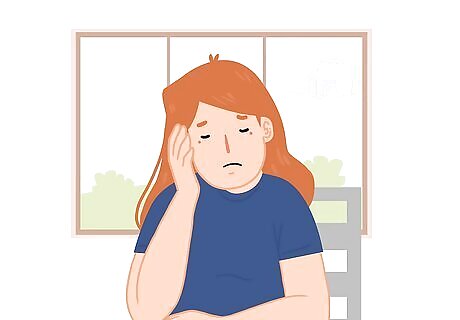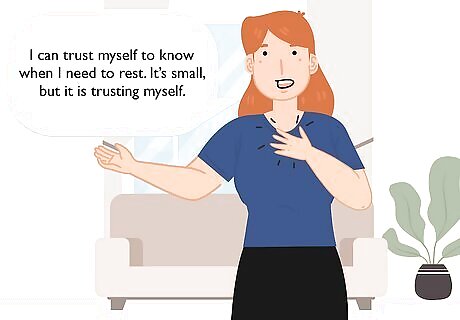
views
Coping with the Effects of Gaslighting

Recognize the signs of gaslighting. If you suspect that your partner is gaslighting you, you should learn all of the different ways that gaslighting can manifest. This can help you recognize the ways in which you were manipulated so that you can recover. Some common signs include: Accusing you of remembering wrong or making up things that happened. Diverting or avoiding talking about certain topics. Claiming that you overreact or that you are too sensitive. Acting as if they do not understand what you are saying. Refusing to talk about their behavior.

Leave the situation. Gaslighting is a form of mental and emotional abuse. It is a way to have power over you and control you. If you have not yet ended this relationship, you should strongly consider it in order to recover from the gaslighting. For instance, if you have recently realized that your partner has been purposely doing things to make you second guess yourself, you should try to leave the relationship. Talk to someone close to you about helping you leave. For example, you might tell your sibling, “Could you help me. I’m being gaslighted and I need to get out of the situation.” Ask a counselor, therapist, or other professional to help you get out of the situation. Contact a crisis hotline for assistance with leaving your situation. They can connect you with other resources.

Reduce your stress. Because it is a form of abuse, gaslighting can be very stressful on you. You may constantly feel nervous, tense, or tired. You can recover from gaslighting if you make an effort to reduce the overall stress in your life. Try stress reduction techniques like meditation, deep breathing, or visualization. There are several different types of meditation that you can use to relieve you stress. You might try mindfulness, yoga, concentration or another type. Practice visualizing yourself some place peaceful. Picture yourself in detail. For example, picture your relaxed forehead and chin. Visualize the smile on your face and the happiness in your eyes.

Address your anxiety. When you are gaslighted, you may end up feeling anxious or nervous. You might feel like you need to be always on alert because you don’t know when the person will accuse you of something you didn’t do. In order to recover from gaslighting, you should explore ways to calm yourself and manage any anxiety you may feel. For instance, if you notice that you are feeling nervous about how you look because your partner used to always critique your outfit choices, you should address your feelings. When you find yourself feeling anxious try calming yourself by using mindfulness techniques. Be present in the moment. Acknowledge and accept what you are feeling without judgment. Focus on your breathing by thinking ‘in’ when you inhale and ‘out’ when you exhale, if you are in the middle of an anxiety attack.

Handle any depression. It is not uncommon for people that are being gaslighted to experience depression. You don’t have to let the depression overcome you, though. You can recover from gaslighting if you make sure that you address any depressive symptoms that you may be having. For example, you may notice that during your relationship, and now, that you are having trouble completing daily tasks, feeling fatigued, or you like you don’t have energy or interest in anything. Learn about the symptoms of depression that you may not be aware of like unexplained physical problems, trouble concentrating, changes in appetite, or changes in sleeping habits. Consider seeking professional help for treatment options that can help you cope with depression. A professional can help you determine if you might want to try medication, therapy, or another treatment. Develop ways to cope with your depression in everyday life. For example, create a schedule or routine for yourself and stick to it. You should also avoid drinking alcohol or using other substances to help you cope.

Keep yourself safe. It can be difficult leaving an abusive relationship, and your abuser may try to prevent you from leaving for good. It is a good idea to create a safety plan so that you can remain safe after you leave. Get a new phone number, and ask the phone company to keep it unlisted, so that your name does not show up on caller ID. If you're worried that they will hurt you, you can get a restraining order. Let your neighbors and work know about the order. You may need to move to a new home. If you decide not to move, you should at least change the locks.
Rebuilding Trust in Yourself and Others

Listen to yourself. This might be the hardest thing you will have to do to recover from gaslighting, but it is also one of the most important. When you are gaslighted you begin to ignore your inner voice and tune your intuition out. Start with small things. For example, listen to yourself about whether you are hungry or tired or not. Say to yourself, “I can trust myself to know when I need to rest. It’s small, but it is trusting myself.” Don’t feel as though you need to rush to make a decision or give that power to someone else. Tell yourself, “I can take my time and see how I feel about my options before I make a decision.” Tell yourself, “I can trust myself and listen to my own judgment” when you start to doubt yourself.

Do some fact checking. One of the effects of gaslighting is that, over time, you begin to doubt yourself and you also doubt others. Even when someone else tells you something, when you are being gaslighted you reach the point where you only trust what your partner is telling you. When you are recovering from gaslighting you can rebuild your trust in other people by verifying the truth of what people tell you. Try to re-establish trust with one or two people close to you first. Pick people that you know have always been there for you and who support you. For example, you might turn to a family member. Use these people as fact checkers. For example, if your sister tells you that you look nice, you can ask your mom if your sister is telling the truth or not.

Keep a journal. You can recover from gaslighting by writing it down when you have an experience that rebuilds your trust in yourself and in other people. Keeping a journal of trust-building experiences can help you see that you do have good judgment and that you can put your faith in other people. Write it down when you make a decision and it turns out to be the right choice. For instance, you might write it down if you decided to bring your umbrella on a sunny day that turned into a major rain. Make a journal entry when other people do things that re-affirm your trust in them. For example, if your friend follows through on what he said he would do, then write it down.

Use positive self-talk. People that have been gaslighted may find themselves feeling worthless, hopeless, or worse because of the manipulation of someone else. You can recover from gaslighting if you improve your self-esteem by using positive self-talk. Make a list of the good things about you in your journal and use some of the words on the list when you are talking to yourself. Instead of calling yourself forgetful, crazy, stupid, or pitiful, say things like, “I’m a worthy person. I have a lot of good qualities and I can trust myself.”

Spend time doing things you enjoy. When you have been gaslighted you have probably not had the opportunity recently to do things that bring a smile to your face. Often, in situations like this, you are only allowed to do what the other person wants. You may even forget what things you enjoy doing. You can recover from gaslighting if you make an effort to do things that you enjoy. Take at least five minutes each day to do something just because it puts a smile on your face. For example, do some mirror karaoke as you are getting ready in the morning. Make an effort to try things you used to enjoy but haven’t been able to do in a while. For example, if you used to love playing the piano, go take a couple of refresher classes and see if the love is still there.

Promote your physical health. Gaslighting may result in you neglecting your health and well-being because you are manipulated into thinking it’s not important. You will find it easier to recover from gaslighting if you feel well, have energy, and can focus. Take the time to do things that will keep you healthy. Participate in physical activity like yoga, martial arts, or even going for a daily walk. Eat nutritious meals and snacks each day to give your body the energy you need to recover from gaslighting. Make sure you are getting enough rest. It will be easier to trust your own judgment and begin making your own decisions again when you are well-rested, energized, and able to focus.
Building a Support Team

Seek professional help. Recovering from gaslighting will be much easier if you have a support team to assist you. Therapists and counselors are an important part of your support team because they can help you recover from gaslighting by supporting you and listening to you. They can also help you address the depression, anxiety, and other stress you may be feeling as a result of being gaslighted. For example, if the gaslighting happened during a long-term relationship, seeking professional help can assist you in identifying and dealing with effects of the abuse. Even if it was a short-lived relationship, adding a professional to your support team can help teach you coping strategies. Talk to a counselor about what you have been through. You can ask your physician, human resources representative, or school counselor for a referral to a counselor. If you are experiencing anxiety or depressive symptoms or other significant problems coping, a counselor can discuss treatment options with you.

Rely on a family and friends. When someone gaslights you, they often isolate you from other people in your life that care about you. They convince you that they are the only person that knows what is right for you. Rebuilding your relationship with family, friends, and other people in your life and relying on them as a part of your support team will help you recover from gaslighting. Ask someone close to you to just spend time with you. You all don’t have to go anywhere or do anything. Try saying, “Can we spend a little time together just chilling?” Accept their invitations when friends and family members ask you to go places with them. Start out spending small amounts of time together. For example, go for a frozen yogurt or a cup of coffee.

Join a support group. One way to recover from gaslighting is to connect with people that have been through similar experiences. Hearing their stories and how they recovered from gaslighting can provide you with strategies and tips that will help you overcome it as well. Being a part of a support group can also help boost your self-esteem from the positive interactions and create new social relationships for you. Check with organizations in your community for victims of domestic abuse, your religious leader, or a mental health professional for suggestions on finding a support group near you. Consider joining an online forum or support group if you aren’t able to attend an in-person support group.

















Comments
0 comment